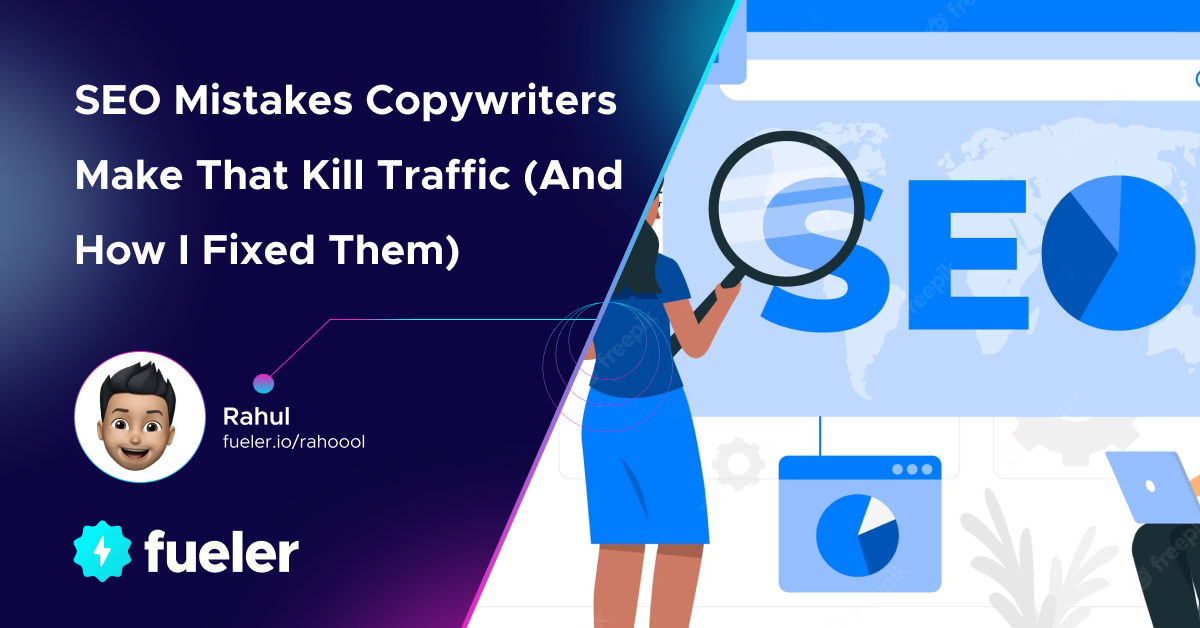SEO Mistakes Copywriters Make That Kill Traffic (And How I Fixed Them)

Team Fueler
19 Sep, 2023

Have you ever spent hours crafting an epic piece of content, only to see it flop once you hit publish? As a copywriter, seeing your work struggle to gain traction can be disheartening.
The problem may not be your writing skills or the topic you chose. The real issue could be something much simpler: SEO mistakes.
After years of writing content for clients, I’ve made my fair share of SEO mistakes. Things like keyword stuffing, unoptimized page titles, and lack of internal linking have all led to content that failed to rank or drive traffic.
But through trial and error, I’ve learned how to fix these mistakes and boost the performance of my content.
In this post, I’m going to show you the 7 most common SEO mistakes copywriters make so you have the chance to learn from mistakes and avoid them.
Let's dive in.
1. Forgetting to Do Keyword Research
Keyword research is the foundation of any good SEO strategy. If you skip this step, you risk tanking your traffic and rankings. I learned this the hard way early on.
Targeting the Wrong Keywords
I used to just write about whatever topics I found interesting without checking the search volume or difficulty. Big mistake. I was targeting keywords with almost no search traffic, so no one could find my content.
To fix this, I started using free tools like Google's Keyword Planner to find keywords and phrases with high search volume that I could realistically rank for. I looked for long-tail keywords, like "types of content marketing strategies" instead of just "content marketing." The more specific the keyword, the less competition.
Not Optimizing for Voice Search
People are using voice assistants like Siri and Alexa more and more to search the web. If your content isn't optimized for voice search, you'll miss out on a huge amount of potential traffic.
To optimize for voice search, use natural language in your content, as people would actually speak.
For example, instead of "10 Methods to Increase Website Traffic," say "Here are ten ways to boost traffic to your website." Keep sentences concise, and avoid complex words and grammar. Speaking like a human will make your content much more accessible to voice search engines.
2. Stuffing in Irrelevant Keywords
Have you ever stuffed your copy full of keywords thinking it would boost your rankings? I know I did, and it was a big mistake. Search engines are smarter now and can spot keyword stuffing from a mile away. It looks spammy and will hurt your rankings.
Instead, write naturally for humans first. Focus on providing real value to your readers. Use keywords where they make sense, but don't overdo it. For example:
- Don't repeat the same keyword multiple times in one sentence.
- Don't use keywords that don't relate to your topic.
- Don't keyword stuff in headings, page titles or meta descriptions either.
Search engines want to see that keywords appear in a natural, organic way. They can tell if you're optimizing for search engines over human readers.
For example, say you have a page about the health benefits of turmeric. Don't write something like:
"Turmeric, the golden spice, is a superfood with many health benefits. The turmeric plant is part of the ginger family. Turmeric contains curcumin, a powerful anti-inflammatory compound found in turmeric."
That's way too repetitive and doesn't sound natural. Instead, write something like:
"Turmeric is a flavorful golden spice used in curries and alternative medicine. It contains curcumin, a potent anti-inflammatory compound. Turmeric may help reduce inflammation in the body and ease symptoms of joint pain and arthritis. Adding turmeric to your diet could also boost brain function and may help prevent some types of cancer."
This summary highlights the key benefits of turmeric without overusing the keyword. It flows better and provides more value to readers.
3. Not Optimizing Page Elements
One of the biggest mistakes copywriters make is not optimizing page elements for search engines. By page elements, I mean things like:
Meta descriptions
The meta description is the short snippet of text below your page title in search results. If it’s not optimized, you’re missing an opportunity to grab the reader’s attention and get that click.
Make sure your meta description includes your target keyword, is between 150 to 160 characters, and is compelling enough to generate interest. You can use a free meta description generator to quickly create a strong and relevant description that boosts your visibility.
Headings
Headings break up your content and create a visual hierarchy for readers. For SEO, headings also tell search engines what each section is about.
Use your target keyword in the H1 and H2 headings when possible. Just be sure not to overstuff—use your keyword naturally and make the headings compelling for readers too.
Alt text
Alt text describes images to search engines and screen readers for the visually impaired. Include your target keyword in the alt text of images related to your topic. Keep alt text short, around 125 characters.
Internal links
Link to other relevant content on your site using internal linking best practices. When you link internally, use keyword-rich anchor text. For example, instead of “click here,” use “content writing tips.” Internal links pass authority to pages and keep visitors engaged on your site.
URLs
A clean, keyword-rich URL can give your page a boost in search rankings. If possible, use your target keyword in the page URL, like yourwebsite.com/content-writing-tips.
Optimizing these elements signals to search engines that your page is relevant for certain keywords and topics. It helps get you discovered in search and keeps visitors engaged once they click through to your content.
4. Overlooking Local SEO Factors
One of the biggest mistakes I made early on was ignoring local SEO for my clients. I focused so much on optimizing for search engines in general that I overlooked the factors that determine how sites rank for local searches.
Once I realized how much traffic I was missing out on, I made some changes.
- Local SEO is critical if you want to rank for searches containing location modifiers like “copywriting services your city name”. Things like your business name, address, and phone number (NAP) need to be consistent across directories like Google My Business, Bing Places for Business, and Yelp. Additionally, using a domain name suggestion tool can help you find a relevant and memorable domain that aligns with your local SEO strategy.
- Another factor is proximity - the closer your business is to the searcher, the higher you’ll rank in local results. So I geotagged images, videos, and posts on social media to pinpoint the location of each business. Some platforms like Facebook even allow you to draw a radius around your address to define your service area.
- Optimizing content for local searches also helped. I started including the city and state name, full address, and area code in page titles, meta descriptions, image alt text, and the content itself. Using phrases like “copywriting services for Atlanta businesses” or “work with the top copywriters in San Diego” made a big difference.
- Build location-based backlinks too. Get listed in local directories and try to get backlinks from other sites in your area. Reach out to local organizations, non-profits, bloggers, and influencers to build high-quality backlinks (using backlink services). I found that backlinks from .edu and .gov sites located in the same city were especially helpful for rankings.
Local SEO does require extra work, but the results are worth it. but the results are worth it. Consulting with local SEO specialists can streamline this process and enhance your local search rankings.
5. Creating Thin, Low-Value Content
One of the biggest SEO mistakes I see copywriters make is creating content that's too thin or low in value. As a copywriter myself, I've been guilty of this at times, churning out 500-word blog posts just to hit an arbitrary word count.
The problem is, that search engines want to see in-depth, useful content. I shifted from short, superficial posts to more comprehensive guides.
For example, instead of a short post on "5 Ways to Optimize Your Website for Mobile," I now aim for ultimate guides like "The Complete Guide to Mobile SEO: 35 Tactics to Boost Your Rankings." Search engines assume longer content that covers a topic thoroughly is of higher quality and more valuable to users.
It's not just about word count, though. Your content needs to be genuinely valuable and helpful. Ask yourself:
- Does this teach readers something new?
- Will it help solve a problem or answer a question?
- Is it offering unique insights or opinions they can't get elsewhere?
If not, keep working on it.
Also, avoid repetitive or duplicated content. If you've already covered a topic, link to that post instead of rehashing the same points. Come at it from a new angle or share new examples and case studies.
The bottom line is you need to create amazing, in-depth content that provides real value to readers. That's what search engines want to rank, and that's what builds a loyal audience.
So stop skimping on content and start delivering epic value.
Conclusion
By avoiding these 7 common SEO mistakes, you'll be well on your way to boosting traffic and gaining more visibility. Remember, Google and your readers want high-quality, valuable content.
Optimize -- Test -- Repeat.
Thank you for reading.
Must read on SEO:
- 12 Types of Copywriting Every Marketer Needs to Master
- SEO Copywriting Made Easy: 10 Tips to Boost Your Traffic
- 10 Copywriting Project Ideas to make your Portfolio Impressive

